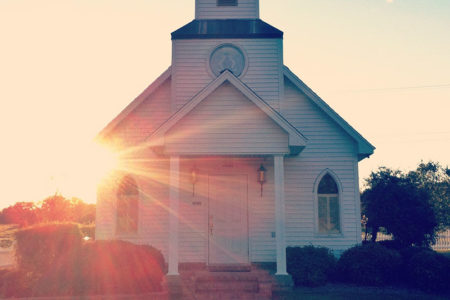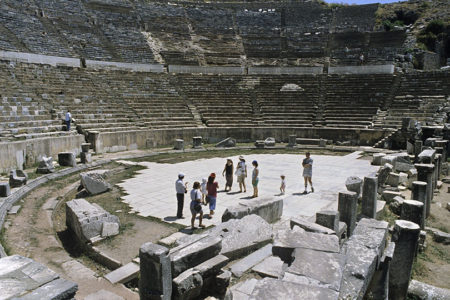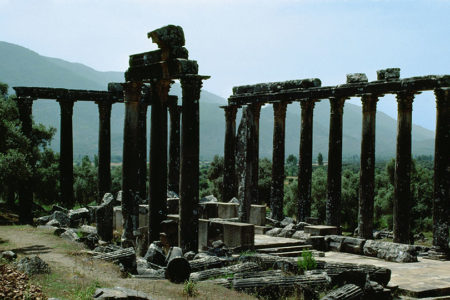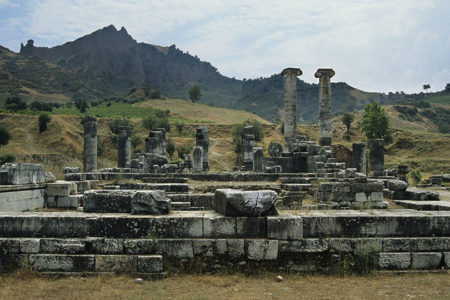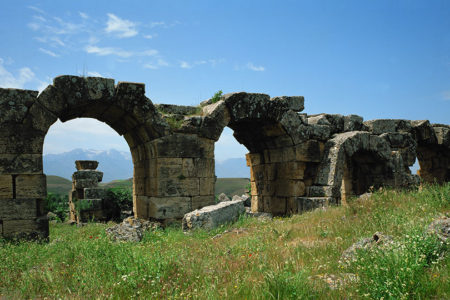Philadelphia: The Little Church that Could Revelation 3:7–13
No matter the nature or size of life’s obstacles, Jesus expects His church to take advantage of the doors He has opened.
To the brethren at Philadelphia, the Lord described Himself as the one who has authority over the church—as “He who is holy, He who is true, ‘He who has the key of David, He who opens and no one shuts, and shuts and no one opens’” (Rev. 3:7). His combined attributes—particularly His holiness, truthfulness, and sovereignty—are emphasized to encourage the struggling but faithful church at Philadelphia. It’s the only church of the seven that receives no criticism.
Jesus came alongside. He knew the deeds of believers there, their faithful struggle in His assigned vineyard. He reminded them that no one could prevent their completion of this ministry. As He said in Matthew 16:18, “I will build My church, and the gates of Hades shall not prevail against it.”
Rather than criticize their “little strength,” he cited it as the reason for His opened door:
I know your works. See, I have set before you an open door, and no one can shut it; for you have a little strength, have kept My word, and have not denied My name (v. 8).
Since He did not tell them to seek power (ability of the Holy Spirit, for example), the word little apparently referred to their size and/or impact. Nevertheless, they kept His Word and held forth His name.
Like Jonathan’s approach to the overwhelming size and strength of the Philistines in King Saul’s day, these saints should say, “It may be that the Lᴏʀᴅ will work for us. For nothing restrains the Lᴏʀᴅ from saving by many or by few” (1 Sam. 14:6). These believers may not have taken Philadelphia by storm, but they made inroads. Now they needed the same encouragement Jesus gave the apostle Paul in Corinth: “Do not be afraid, but speak, and do not keep silent; for I am with you, and no one will attack you to hurt you; for I have many people in this city” (Acts 18:9–10).
Then Jesus promised victory. He would deal with “the synagogue of Satan, who say they are Jews and are not, but lie” (3:9). These were Jewish people who were spiritually estranged from the God who chose them and therefore were hostile toward their Messiah’s program. Apparently, Jesus would bring some of these Jewish people into His church, as He brought Saul of Tarsus who became the apostle Paul.
The translation here is difficult. Literally, the Greek says, “Behold, I am giving from [didomi ek, “giving out of”] the synagogue.” Bringing some recalcitrant Jewish folks into the church seems more likely Jesus’ meaning. The alternative would mean bringing the entire synagogue into humble submission and acknowledgement of Jesus’ love for the church. Because of His love for the Jewish people, He exhorted the church to continue its efforts to teach Jewish people the truth about Him; it would be successful.
Then Jesus promised protection:
I also will keep you from the hour of trial which shall come upon the whole world, to test those who dwell on the earth. Behold, I am coming quickly! Hold fast what you have, that no one may take your crown (vv. 10–11).
In light of promised protection, Jesus encouraged the Philadelphians to “hold fast.” The context argues for the “crown of life,” which is given to “the man who endures temptation; for when he has been approved, he will receive the crown of life” (Jas. 1:12). Using God’s wisdom to endure life’s trials produces great reward.
Once again incentives are offered for saints to heed Jesus’ words and serve Him faithfully:
He who overcomes, I will make him a pillar in the temple of My God, and he shall go out no more. I will write on him the name of My God and the name of the city of My God, the New Jerusalem, which comes down out of heaven from My God. And I will write on him My new name (v. 12).
Being “a pillar in the temple of My God” seems to be a promise of prominence for these overcomers (cf. Gal. 2:9). Being such a pillar that bears the names of God, Jerusalem, and Jesus seems to connote honor and significance.
No matter the nature or size of obstacles, Jesus expects His church to go through the doors He has opened. And He encouraged the humanly unimportant church at Philadelphia to fulfill every opportunity for ministry despite what appeared to be overwhelming opposition and trial, because it was the little church that could.

